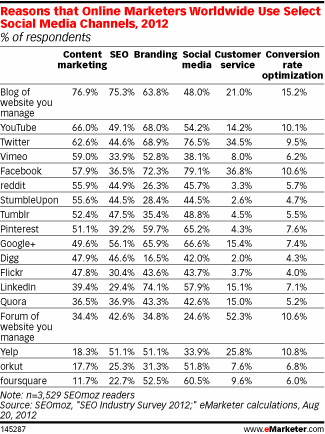Does blogging improve conversion?
According to new research by SEOmoz, which surveyed marketers from around the world the answer is yes.
The study is featured on eMarketer – SEO, Social and Content Marketing in Top Demand – and has much more information than the info on conversion. There is reason to believe that blogging and other forms of content marketing will continue to grow in demand not only among marketers, but among a variety of business industries.
Blogging Improves Conversion
It’s a bold statement, but check out the data analyzed by eMarketer.
At the top right of the chart you’ll see that over 15% of marketers in the survey use blogging to improve conversion rate optimization. That’s a pretty large number considering it outpaces the closest activities by over 4%.
You can also see that blogging is used almost the most for every reason offered in the survey including content marketing (obvious), SEO, branding and customer service. It’s obvious that marketers view blogging as one of if not the best way for brands to handle a variety of marketing activity including the most important activity: sales (conversion).
But you’re probably asking yourself just how blogging can increase conversion.
Let’s review the ways.
Blogging Builds Trust and People Buy From People They Trust
Trust is an important aspect of selling. People purchase from people they seemingly trust. A brand might get away with a sale by faking trust, but usually people learn quickly and only one sale occurs. Real trust with a brand comes from providing something worthwhile in the eyes of the customer. This creates a long-term relationship, which we’ll talk about in the third point.
By blogging you’re creating trust in a couple different ways. First, you’re providing helpful information that the customer can use to improve their life. Consider a plumber that creates a series of blog posts about basic plumbing issues that many potential customers can do on their own. The plumber could even right about the type of products that are good and those to shy away from.
By being this source of useful information the readers learn to trust the plumber. If the ideas he shares turn out to be true the readers know they can take the plumber at his word.
Second, writing consistent articles on a regular schedule shows dependability. That’s important for many people. Even if you don’t realize it you’re being judged on how well you follow a schedule. For many companies this shows how dependable you can be with a product or service.
Blogging Uses The Reciprocity Theory
Each of these three points are related in some way. The plumber in the example above is creating content that is useful and interesting. Not only is this content building trust, but the same content is also using the Reciprocity Theory.
Basically the theory states that when people receive something they feel the need to provide something in return. As a blogger you’re providing useful and valuable information. In return, a certain number of readers will want to return the favor. When they need a plumber to handle big issues they have they will call the blogging plumber because they feel the need to return the favor.
Blogging Creates Long-Term Relationships
Almost more than providing the best product or service consumers appreciate a good relationship. In my experience in business it was almost always better to have a good relationship with the people of a company than it was to have the best product. It’s weird, but as people we appreciate relationships with other people. A relationship can make our lives better than some product or service that might make it better. We crave relationships and a blog creates a relationship with readers.
As you write posts you’re putting your personality and voice into the content. People read your little quirks and they read your stories. They become connected to you and that makes them feel like there is a relationship involved. People purchase services and products based on how good the relationship is with the person at the business.
The most successful salespeople are the best at building relationships with customers.

